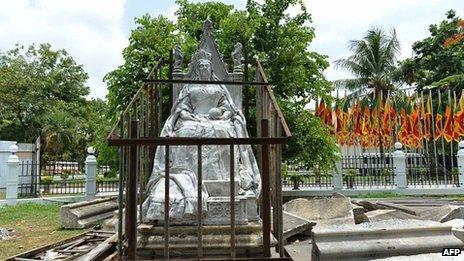UK regrets The Gambia's withdrawal from Commonwealth
- Published
Gambian President Yahya Jammeh told the UN he was determined to defend Gambia's dignity 'by whatever means necessary'
The Gambia's decision to withdraw from the Commonwealth 48 years after joining is something to "very much regret", the UK Foreign Office has said.
The west African nation branded the 54-member grouping, which includes the UK and most of its former colonies, a "neo-colonial institution".
The withdrawal was announced on state TV but no other reasons were given.
Two years ago President Yahya Jammeh accused the UK of backing his political opposition ahead of elections.
Commonwealth officials said they only heard about the move through the media and had not yet been contacted by The Gambia.
A spokesman said Secretary-General Kamalesh Sharma had seen the reports with "dismay and disappointment" and had asked for "clarification" from the country.
There is a history of tension between President Jammeh, who came to power in a 1994 coup, and the UK.
Earlier this year, a Foreign Office report, external singled out The Gambia for its human rights record, citing cases of unlawful detentions, illegal closures of newspapers and discrimination against minority groups.
On Thursday a Foreign Office spokesman said: "Decisions on Commonwealth membership are a matter for each member government. We would very much regret Gambia, or any other country, deciding to leave the Commonwealth."
In August last year The Gambia was criticised by Amnesty International and others for executing nine prisoners by firing squad.
'Colonialism extension'
The Commonwealth was founded in 1931 but acquired its modern shape after 1949 as former British colonies and protectorates, including The Gambia, started to achieve self-government and varying degrees of independence.
According to the Commonwealth's charter, member states should communicate and co-operate "in the common interests of our peoples and in the promotion of international understanding and world peace".
In its statement, The Gambian government said it had "withdrawn its membership of the British Commonwealth".
It said it had "decided that The Gambia will never be a member of any neo-colonial institution and will never be a party to any institution that represents an extension of colonialism".
Ebrima Sankareh, The Gambia Echo newspaper: "What we have... is a disaster. The Commonwealth is very important for The Gambia, it is very significant"
But Bakary Dabo, former vice president of The Gambia and chairman of the country's campaign for democratic change, said people there are generally "very happy" to be part of the Commonwealth.
He said the government had recently begun "picking up war against poorly specified enemies called 'western powers'".
Speaking on BBC Radio 4's Today programme, Mr Dabo said this rhetoric had "accelerated" in recent years and been used when President Jammeh gave a "rambling" speech at the United Nations General Assembly last month
Aids claim
Also at the UN, President Jammeh said homosexuality was one of the three "biggest threats to human existence".
He has also drawn international criticism for claiming he can cure Aids with a herbal body rub and bananas.
BBC Africa analyst Farouk Chothia said despite its image as an idyllic holiday destination, The Gambia, and its population of less than two million, were kept under tight control by its eccentric leader.
The latest decision was bound to come from him, our analyst added.
The Royal Commonwealth Society, an education charity which works in Commonwealth countries, said The Gambia's announcement was unexpected and appeared to be undemocratic.
Society director Michael Lake said President Jammeh had made the decision "without consulting The Gambia's people" and the country's withdrawal would be "a loss felt by both its people and the wider Commonwealth network".
He added: "Far from being a 'neo-colonial institution', the modern Commonwealth operates on a consensus model and its voluntary membership is predicated primarily on a country's commitment to upholding shared values and principles."
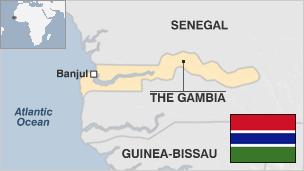
Apart from its Atlantic coastline, The Gambia is entirely surrounded by Senegal
The last time a nation left the Commonwealth was in 2003, when Zimbabwe withdrew.
The Queen, who is 87, is the head of the Commonwealth, which holds its next heads of government meeting in Colombo, Sri Lanka, next month.
However, the gathering will be the first that the Queen has not attended since 1971. She will send her son, the Prince of Wales instead. Buckingham Palace said she would make fewer overseas trips because of her age.
Three African countries have joined the Commonwealth in recent years. Rwanda was admitted in 2009, external after applying for membership the previous year, while Cameroon and Mozambique became members in 1995.
- Published22 January 2017
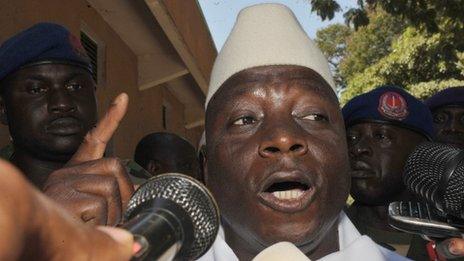
- Published12 April 2023
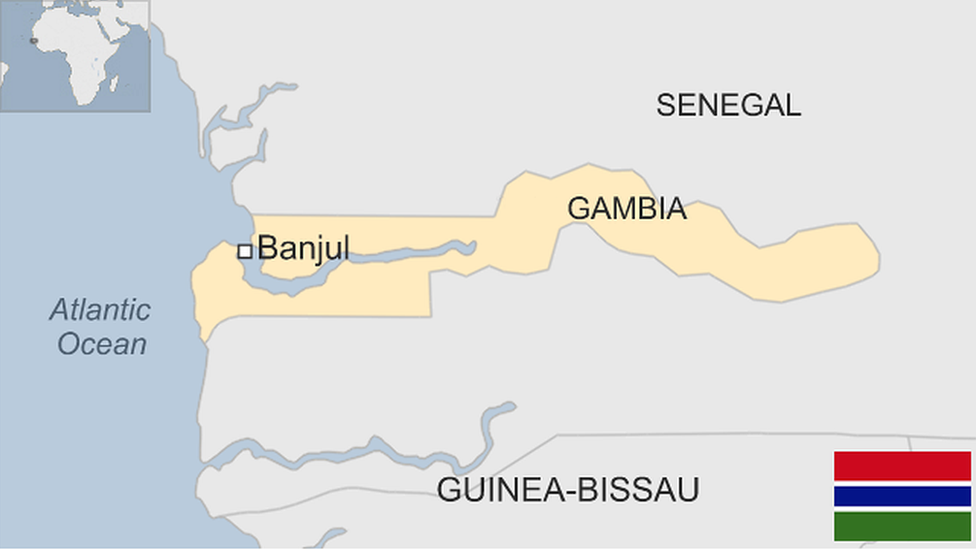
- Published24 August 2017
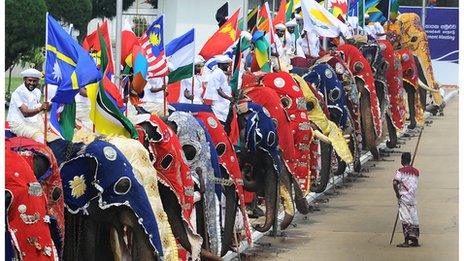
- Published3 October 2013
